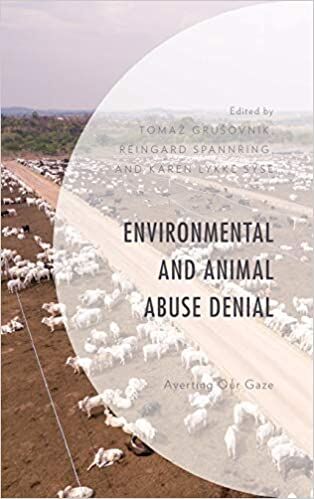Psychology
The Psychology of Denying Science, Common Sense, and Reality
A new book reveals how and why people deny awareness of what's really happening.
Posted December 11, 2020
"Our book focuses on “denialism” as an umbrella term for social, cultural, and psychological mechanisms that help individuals and societies continue with their lifestyles despite facts and figures highlighting the detrimental consequences of their actions for both the environment as well as lives of other animals and even ourselves...collective denial is a sort of “cultural tool kit” to keep disturbing information about the environmental and animal abuse at bay." —Tomaž Grušovnik, Reingard Spannring, and Karen Lykke Syse

A new book called Environmental and Animal Abuse Denial: Averting Our Gaze edited by a transdisciplinary team of scholars—Drs. Tomaž Grušovnik, Reingard Spannring, and Karen Lykke Syse—is an outstanding collection of essays that focus on the hows and the whys by which some humans—a higher number than we'd all like to see—feel comfortable denying facts and data that are assaulting their senses and staring them in their eyes and piercing their ears, noses, skin, and hearts.1,2 The table of contents and the wide range of topics that are considered can be seen here.
The list of areas in which denialism can readily be found include the ongoing and horrific COVID pandemic, climate science, sentience in nonhuman animals (animals), and where meaty meals come from. Among the most egregious denials is in the United States Federal Animal Welfare Act (AWA) in which it's claimed that laboratory rats, mice, and other nonhuman animals aren't animals. It's shocking that only a very few scientists have ever questioned this lunacy. Dogs and other companion animals also are written off as being mere property because legal systems around the globe deny their highly evolved cognitive and emotional lives as are so-called "food animals."

Not only do denialists wind up offering up alt-facts and outright lying about what's known about a wide variety of phenomena by ignoring science, common sense, and reality, but they also somehow convince themselves that they're correct and everyone else is wrong. They seem to deal with attendant cognitive dissonance and confirmation bias, the tendency to search for, interpret, favor, and recall information in a way that confirms or supports one's prior beliefs or values, like water rolling off the back of a duck. What a horrific lesson for youngsters.
Denialism is rampant, dangerous, and destructive, and there are obvious examples in a wide variety of arenas. Most is done "in the name of humans and human exceptionalism." The people who engage in denialism aren't necessarily dumb, but in all honesty, they come across as having very low IQs.
It's extremely important to know more about how and why humans—Homo denialus—are able to ignore facts and deal with cognitive dissonance and confirmation bias. I'm pleased that Drs. Grušovnik, Spannring, and Syse were able to answer a few questions about their seminal book. Here's what they had to say.
Why did you compile the essays for Environmental and Animal Abuse Denial?
We are passionate about preserving ecosystems, wild animals‘ habitats, and animals‘ integrity, and we are deeply concerned that social change does not match the rate of destruction and the enormity of exploitation.
How does your book relate to your backgrounds and general areas of interest?
Tomaž: I’m interested in how cultural frameworks interpret the natural world as finite and “other” to human beings. For instance, we often refuse to recognize animals as moral beings — as compassionate and even just individuals — because the notion of “moral agency” is culturally reserved for us as our ticket to supposed immortality.
Karen: As a cultural historian working on environmental — and agricultural history, I have come to realize that people are overwhelmed when given individual responsibility for consumption patterns that are the result of corporate global and cooperative national ideas. Denial is a way to cope with structural and global complexities. However, understanding the processes that have led us to where we are today, environmental and animal abuse may be easier to change.
Reingard: Working in environmental education, I am particularly interested in how teaching/learning reproduces exploitative cultures and structures, rather than fostering change. Taking care of the factors that trigger denialism is essential for an empathic, creative, and transformative learning environment.
Who is your intended audience?
We address scholars of all disciplines and activists alike who seek a more comprehensive understanding of the invisible walls that impede progress towards a more ethical and sustainable future in a more-than-human world.
What are some of the topics that are woven into your book and what are some of your major messages?
In our book, we start with the insight that the “information deficit model,” which assumes that inaction is a result of lack of information, is too simple to explain why we do not respond to such obvious issues as climate change, environmental destruction, and animal abuse. At the core of the problem often lies the social-psychological phenomenon of cognitive dissonance. It occurs when our beliefs, values, and behavior are not congruent, for example, when we are animal lovers but eat meat. This is an unpleasant state of psychological conflict, which we seek to dissolve through strategies of denial. The book focuses on “denialism” as an umbrella term for social, cultural, and psychological mechanisms that help individuals and societies continue with their lifestyles despite facts and figures highlighting the detrimental consequences of their actions for both the environment as well as lives of other animals and even ourselves.
Denialism allows people to protect themselves from troubling emotions such as the fear of loss of ontological security, helplessness, guilt, and the threat to their individual and collective identities. Individual emotion management, however, is always embedded in a social context that prescribes norms of emotion and selective perception and interpretation. Thus, collective denial is a sort of “cultural toolkit” to keep disturbing information about environmental and animal abuse at bay. Unfortunately, it also contributes to reproducing political and economic power structures and dominant ideologies, which underpin the objectification, commodification, and exploitation of nature and animals.
How does your book differ from others that are concerned with some of the same general topics?
Instead of analyzing the morality of our actions with respect to the environment and animals or relevant policies, our book rather tries to provide insights as to why individuals and societies fail to respond adequately to some of the most pressing issues we face today.
What are some of your current projects?
Tomaž continues to work in the field of our (mis)understanding of animal life, focusing on epistemic virtues that are necessary for the recognition of animals as beings closest to us, hopefully establishing a more balanced relationship with them.
Reingard’s current project involves young people‘s engagement in riverscapes with an ethical stance toward the water and its plant and animal neighbors, a critical understanding of biosocial relationships, aiming at the development of creative solutions for a just socio-ecological community.
Karen is co-authoring a book called LIVE, DIE, BUY, EAT: A Cultural History of Animals and Their Meat and is also part of a research project exploring the development and understanding of locative technologies and the human sense of place 1800-2020.
References
Notes
1) The book's description reads: "The staggering rate of environmental pollution and animal abuse despite constant efforts to educate the public and raise awareness challenges the prevailing belief that the absence of serious action is a consequence of a poorly informed public. In recent decades alternative explanations of social and political inaction have emerged, including denialism. Challenging the information-deficit model, denialism proposes that people actively avoid unpleasant information that threatens their established worldviews, lifestyles, and identities. Environmental and Animal Abuse Denial: Averting Our Gaze analyzes how people avoid awareness of climate change, environmental pollution, animal abuse, and the animal industrial complex. The contributors examine the theory of denialism in regards to environmental pollution and animal abuse through a range of disciplines, including social psychology, sociology, anthropology, philosophy, cultural history and law."
2) Tomaž Grušovnik is associate professor of philosophy of education and senior research fellow in the faculty of education at the University of Primorska in Slovenia; Reingard Spannring is a sociologist at the Institute for Educational Science, University of Innsbruck in Austria; and Karen Lykke Syse is a cultural historian and is associate professor at Centre for Development and the Environment at the University of Oslo in Norway.
Bekoff, Marc. Accusations of "Invasive Species Denialism" Are Flawed.
_____. Hooked on Meat: Evolution, Psychology, and Dissonance.
_____. Do Animals Think or Feel? (The Ontario Federation of Agriculture says no, despite clear evidence they do.)
_____. Homo Denialus: Mice Aren't Animals, Climate Change Is Real.
_____. Wise Advice for Overcoming Biases in Comparative Psychology.
_____. The Psychology Behind Why We Love and Exploit Animals.
_____. Canine Science Shows Dogs Aren't Merely Unfeeling Property. (A legal scholar shreds this inane misconception.)
Spannring, Reingard and Tomaž Grušovnik. Leaving the Meatrix? Transformative learning and denialism in the case of meat consumption. Environmental Education Research 25, 2019.




